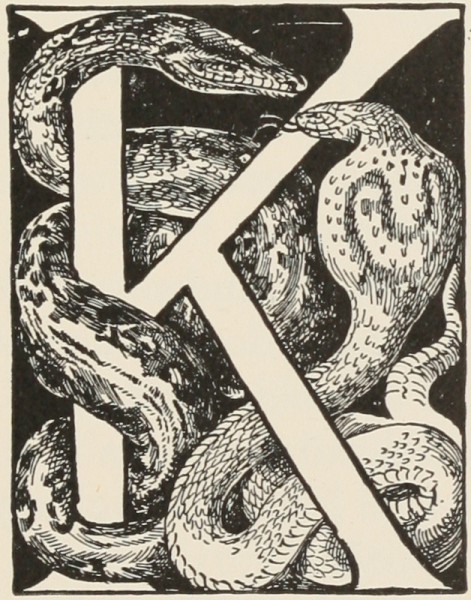Kaa

- Infos
- Photos
- Best films
If you like this character, let us know!
Kaa is a fictional character from the Mowgli stories written by Rudyard Kipling. Kipling describes him as an exceptionally long, yellowish Indian rock python. Kaa is one of Mowgli's mentors and friends. He, Baloo and Bagheera sing for Mowgli "The Outsong" of the jungle. First introduced in the story "Kaa's Hunting" in The Jungle Book, Kaa is a huge and powerful snake, more than a hundred years old and still in his prime. Despite his polite, unhurried demeanor, animals seem to have a fearful respect for Kaa. Bagheera and Baloo first enlist Kaa's help to rescue Mowgli when the man-cub is captured by the Bandar-log (monkeys) and taken to an abandoned human city. Kaa breaks down the wall of the building in which Mowgli is imprisoned and uses his serpentine hypnosis to draw the monkeys toward his waiting jaws. Bagheera and Baloo are also hypnotized, but Mowgli is immune because he is human, and breaks the spell on his friends.In The Second Jungle Book Kaa appears in the first half of the story "The King's Ankus". After he and Mowgli spend some time relaxing, bathing and wrestling, Kaa persuades Mowgli to visit a treasure chamber guarded by an old cobra beneath an ancient city. The cobra tries to kill Mowgli but its poison has dried up. Mowgli takes a jeweled item away as a souvenir, not realizing the trouble it will cause in the second half of the story, and Kaa departs.
In "Red Dog" Mowgli asks Kaa for help when his wolf pack is threatened by rampaging dholes (the red dogs of the title). Kaa goes into a trance so that he can search his century-long memory for a stratagem to defeat the dogs:
“
For a long hour Mowgli lay back among the coils, while Kaa, his head motionless on the ground, thought of all that he had seen and known since the day he came from the egg.
The light seemed to go out of his eyes and leave them like stale opals, and now and again he made little stiff passes with his head, right and left, as though he were hunting in his sleep. Mowgli dozed quietly, for he knew that there is nothing like sleep before hunting, and he was trained to take it at any hour of the day or night.
Then he felt Kaa’s back grow bigger and broader below him as the huge python puffed himself out, hissing with the noise of a sword drawn from a steel scabbard;
“I have seen all the dead seasons,” Kaa said at last, “and the great trees and the old elephants, and the rocks that were bare and sharp-pointed ere the moss grew. Art thou still alive, Manling?”
”
With Kaa's help Mowgli tricks the dholes into attacking prematurely. Kaa takes no part in the resulting battle (obliquely citing his loyalty to the boy rather than to the wolves, who often caused Mowgli grief) but Mowgli and the wolves finally kill all the dholes, though not without grievous losses. Kaa makes his last appearance in "The Spring Running," as the teenage Mowgli reluctantly prepares to leave the jungle for the last time. "It is hard to cast the skin," he tells Mowgli, but Mowgli knows he must cast the skin of his old life in order to grow a new one.
Best films
Played by the actors
Filmography of Kaa (6 films)

Mowgli: Legend of the Jungle (2018)
, 1h44Directed by Andy Serkis
Origin United-kingdom
Genres Drama, Fantasy, Adventure
Themes Films about animals, Films about children, Le thème de l'enfant sauvage, Wolves in film, Mise en scène d'un ours, Films about apes, Mise en scène d'un tigre, L'enfance marginalisée, Mise en scène d'un mammifère
Actors Rohan Chand, Andy Serkis, Christian Bale, Matthew Rhys, Benedict Cumberbatch, Freida Pinto
Rating64%





Enfant, Mowgli est élevé par une meute de loups au cœur de la jungle indienne. Tandis qu'il apprend les lois souvent âpres de la jungle, sous la responsabilité de l'ours Baloo et de la panthère Bagheera, Mowgli est accepté par les animaux de la jungle comme l'un des leurs – sauf par le terrible tigre Shere Khan. Mais des dangers bien plus redoutables guettent notre héros, au moment où il doit affronter ses origines humaines.

Jungle Book: Origins (2017)
Directed by Andy Serkis
Origin United-kingdom
Genres Drama, Fantasy, Adventure
Themes Films about animals, Films about children
Actors Rohan Chand, Benedict Cumberbatch, Christian Bale, Matthew Rhys, Andy Serkis, Cate Blanchett
Rating64%





Mowgli, the human child, is raised by a wolf pack in the jungles of India. He learns the tough rules of the jungle, under the tutelage of a bear named Baloo and a panther named Bagheera. Mowgli is accepted by all the animals of the jungle as one of their own, but the fearsome tiger Shere Khan is not ready to accept.

The Jungle Book (2016)
, 1h46Directed by Jon Favreau
Origin USA
Genres Drama, Fantasy, Adventure, Animation
Themes Films about animals, Films about children, Le thème de l'enfant sauvage, Wolves in film, Mise en scène d'un ours, Films about snakes, Films about apes, Mise en scène d'un tigre, L'enfance marginalisée, Buddy films, Children's films, Mise en scène d'un mammifère, Reptile
Actors Ben Kingsley, Idris Elba, Neel Sethi, Scarlett Johansson, Christopher Walken, Bill Murray
Rating72%





When the fearsome tiger Shere Khan (Idris Elba) threatens his life, Mowgli (Neel Sethi), a boy raised by wolves, leaves his jungle home and, guided by Bagheera the panther (Ben Kingsley) and the free-spirited bear Baloo (Bill Murray), sets out on a journey of self-discovery.

Mickey's House of Villains (2001)
, 1h8Directed by Burton Gillett, Jack King
Origin USA
Genres Comedy, Animation
Themes Films about animals, Films about dogs, Films about birds, Mise en scène d'un rongeur, Mise en scène d'une souris, Children's films, Mise en scène d'un mammifère
Actors Wayne Allwine, Russi Taylor, Jeff Bennett, Tony Anselmo, Bill Farmer, Susanne Blakeslee
Rating66%





It is Halloween night at the House of Mouse, and a lot of villains are showing up. Jafar has a trick in store for the usual heroes of the House, but the villains have to wait until midnight for him to unleash it.

The Jungle Book 2 (1993)
, 1h12Directed by Wolf Gremm
Origin USA
Genres Musical theatre, Adventure, Musical, Crime, Animation
Themes Films about animals, Films about children, Le thème de l'enfant sauvage, Film d'animation mettant en scène un animal, Mise en scène d'un ours, Films about apes, Mise en scène d'un tigre, L'enfance marginalisée, Musical films, Children's films, Mise en scène d'un mammifère
Actors Haley Joel Osment, Hannelore Elsner, John Goodman, Heinz Hoenig, Mae Whitman, Michaela May
Rating53%





Mowgli is living in the Man Village with the girl who lured him in, Shanti, his adopted brother Ranjan, and their parents. However, Mowgli longs to return to the fun of the jungle, and after nearly leading the other children of the village into the jungle, is punished by his adopted father for trying to lead them into danger. Meanwhile, in the jungle, Shere Khan has returned to Baloo and Bagheera's part of the jungle to exact revenge on Mowgli. Baloo sneaks into the Man Village and gets Mowgli to come with him to live in the jungle; however, unbeknownst to them, Shere Khan also infiltrated the village, only to be chased off by the village people. In the ensuing chaos of the tiger's attack, Shanti and Ranjan go into the jungle to retrieve Mowgli, believing that Baloo is a hostile animal and kidnapped the boy.

The Jungle Book (1967)
, 1h18Directed by Wolfgang Reitherman
Origin USA
Genres Comedy, Musical theatre, Adventure, Musical, Animation
Themes Films about animals, Films about children, Le thème de l'enfant sauvage, Films about music and musicians, Film d'animation mettant en scène un animal, Wolves in film, Mise en scène d'un ours, Films about apes, Mise en scène d'un tigre, L'enfance marginalisée, Musical films, Buddy films, Children's films, Mise en scène d'un mammifère
Actors Bruce Reitherman, Phil Harris, Louis Prima, George Sanders, Sterling Holloway, Sebastian Cabot
Rating75%





Mowgli, a young orphan boy, is found in a basket in the deep jungles of India by Bagheera, a black panther who promptly takes him to a mother wolf who has just had cubs. She raises him along with her own cubs and Mowgli soon becomes well acquainted with jungle life. Mowgli is shown ten years later, playing with his wolf siblings.
 Connection
Connection




